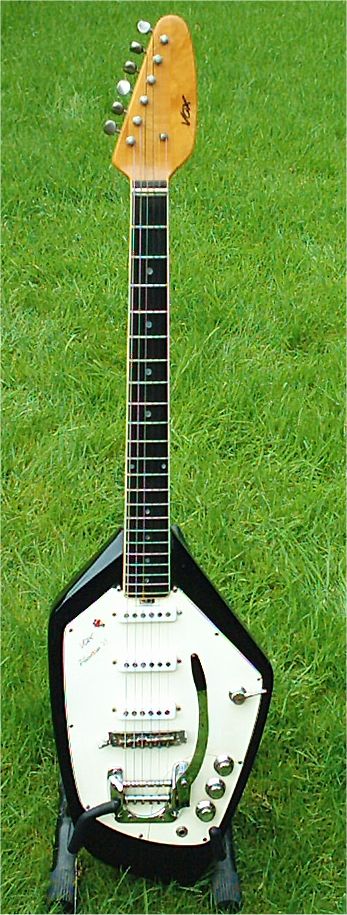|
Vox Teardrop
The Mark is an electric guitar made by Vox. The instrument is also known as the Vox Teardrop, but this is not the official name. The Vox Mark came in three variations, a 6 string (the Mark VI), a 9 string (the Mark IX) and a 12 string (the Mark XII) History In 1962, Vox introduced the pentagonal Phantom guitar, originally made in Kent, England but soon after made by EKO of Italy. It was followed a year later by the teardrop-shaped Mark VI, the prototype of which was made specifically for Brian Jones of The Rolling Stones, using a non-tremolo Fender Stratocaster bridge. The Mark VI was released in three versions, as a 6-string, a 9-string, and a 12-string. The 9-string had three wound strings and three pairs of unwound strings. The Phantom guitar received an international prize for best design when it was released. Even though Vox discontinued the production of these guitars in the seventies, accurate copies of the Teardrop and other Vox models are still manufactured by Jack ... [...More Info...] [...Related Items...] OR: [Wikipedia] [Google] [Baidu] |
Vox (musical Equipment)
Vox is a British musical equipment manufacturer founded in 1957 by Thomas Walter Jennings in Dartford, Kent, England. The company is most famous for making the Vox AC30 guitar amplifier, used by The Beatles, The Rolling Stones, The Kinks, The Yardbirds, Queen, Dire Straits, U2, and Radiohead; the Vox Continental electric organ, the Vox wah-wah pedal used by Jimi Hendrix, and a series of innovative electric guitars and bass guitars. Since 1992, Vox has been owned by the Japanese electronics firm Korg. History Beginnings The Jennings Organ Company was founded by Thomas Walter Jennings in Dartford Kent, England after World War II. Jennings's first successful product was the Univox, an early self-powered electronic keyboard similar to the Clavioline. In 1956, Jennings was shown a prototype guitar amplifier made by Dick Denney, a big band guitarist and workmate from World War II. The company was renamed Jennings Musical Industries, or JMI, and in 1958 the 15-watt Vox AC15 ampl ... [...More Info...] [...Related Items...] OR: [Wikipedia] [Google] [Baidu] |
Fender Stratocaster
The Fender Stratocaster, colloquially known as the Strat, is a model of electric guitar designed from 1952 into 1954 by Leo Fender, Bill Carson, George Fullerton, and Freddie Tavares. The Fender Musical Instruments Corporation has continuously manufactured the Stratocaster since 1954. It is a double- cutaway guitar, with an extended top "horn" shape for balance. Along with the Gibson Les Paul, Gibson SG, and Fender Telecaster, it is one of the most-often emulated electric guitar shapes. "Stratocaster" and "Strat" are trademark terms belonging to Fender. Guitars that duplicate the Stratocaster by other manufacturers are sometimes called ''S-Type'' or ''ST-type'' guitars. The guitar introduced into the popular market several features that were innovative for electric guitars in the mid-1950s. The distinctive body shape, which has become commonplace among electric guitars, was revolutionary for the time period, and for the first time a mass-market electric guitar did not significan ... [...More Info...] [...Related Items...] OR: [Wikipedia] [Google] [Baidu] |
Joy Division
Joy Division were an English rock band formed in Salford in 1976. The group consisted of vocalist Ian Curtis, guitarist/keyboardist Bernard Sumner, bassist Peter Hook and drummer Stephen Morris. Sumner and Hook formed the band after attending a June 1976 Sex Pistols concert. While Joy Division's first recordings were heavily influenced by early punk, they soon developed a sparse sound and style that made them one of the pioneers of the post-punk movement. Their self-released 1978 debut EP ''An Ideal for Living'' drew the attention of the Manchester television personality Tony Wilson, who signed them to his independent label Factory Records. Their debut album ''Unknown Pleasures'', recorded with producer Martin Hannett, was released in 1979. Frontman Curtis struggled with personal problems including a failing marriage, depression, and epilepsy. As the band's popularity grew, Curtis's health condition made it increasingly difficult for him to perform; he occasionally experi ... [...More Info...] [...Related Items...] OR: [Wikipedia] [Google] [Baidu] |
Jimmy Page
James Patrick Page (born 9 January 1944) is an English musician who achieved international success as the guitarist and founder of the rock band Led Zeppelin. Page is prolific in creating guitar riffs. His style involves various alternative guitar tunings and melodic solos, coupled with aggressive, distorted guitar tones. It is also characterized by his folk and eastern-influenced acoustic work. He is also noted for occasionally playing his guitar with a cello bow to create a droning sound texture to the music. Page began his career as a studio session musician in London and, by the mid-1960s, alongside Big Jim Sullivan, was one of the most sought-after session guitarists in Britain. He was a member of the Yardbirds from 1966 to 1968. When the Yardbirds broke up, he founded Led Zeppelin, which was active from 1968 to 1980. Following the death of Led Zeppelin drummer John Bonham, he participated in a number of musical groups throughout the 1980s and 1990s, more specifically X ... [...More Info...] [...Related Items...] OR: [Wikipedia] [Google] [Baidu] |
Distortion (music)
Distortion and overdrive are forms of audio signal processing used to alter the sound of amplified electric musical instruments, usually by increasing their gain, producing a "fuzzy", "growling", or "gritty" tone. Distortion is most commonly used with the electric guitar, but may also be used with other electric instruments such as electric bass, electric piano, synthesizer and Hammond organ. Guitarists playing electric blues originally obtained an overdriven sound by turning up their vacuum tube-powered guitar amplifiers to high volumes, which caused the signal to distort. While overdriven tube amps are still used to obtain overdrive, especially in genres like blues and rockabilly, a number of other ways to produce distortion have been developed since the 1960s, such as distortion effect pedals. The growling tone of a distorted electric guitar is a key part of many genres, including blues and many rock music genres, notably hard rock, punk rock, hardcore punk, acid rock, a ... [...More Info...] [...Related Items...] OR: [Wikipedia] [Google] [Baidu] |
Timbre
In music, timbre ( ), also known as tone color or tone quality (from psychoacoustics), is the perceived sound quality of a musical note, sound or musical tone, tone. Timbre distinguishes different types of sound production, such as choir voices and musical instruments. It also enables listeners to distinguish different instruments in the same category (e.g., an oboe and a clarinet, both Woodwind instrument, woodwind instruments). In simple terms, timbre is what makes a particular musical instrument or human voice have a different sound from another, even when they play or sing the same note. For instance, it is the difference in sound between a guitar and a piano playing the same note at the same volume. Both instruments can sound equally tuned in relation to each other as they play the same note, and while playing at the same amplitude level each instrument will still sound distinctively with its own unique tone color. Experienced musicians are able to distinguish between diff ... [...More Info...] [...Related Items...] OR: [Wikipedia] [Google] [Baidu] |
Wah-wah Pedal
A wah-wah pedal, or simply wah pedal, is a type of electric guitar effects pedal that alters the tone and frequencies of the guitar signal to create a distinctive sound, mimicking the human voice saying the onomatopoeic name "wah-wah". The pedal sweeps the peak response of a frequency filter up and down in frequency to create the sound, a spectral glide, also known as "the wah effect". The wah-wah effect originated in the 1920s, with trumpet or trombone players finding they could produce an expressive crying tone by moving a mute in and out of the instrument's bell. This was later simulated with electronic circuitry for the electric guitar when the wah-wah pedal was invented. It is controlled by movement of the player's foot on a rocking pedal connected to a potentiometer. Wah-wah effects may be used as a fixed-filter to alter an instrument’s timbre (known as a “cocked-wah”); they may be used when a guitarist is soloing; or, classically, they may be used to create a "wa ... [...More Info...] [...Related Items...] OR: [Wikipedia] [Google] [Baidu] |
David Bowie's Vox Mark VI Guitar, HRC Warsaw
David (; , "beloved one") (traditional spelling), , ''Dāwūd''; grc-koi, Δαυΐδ, Dauíd; la, Davidus, David; gez , ዳዊት, ''Dawit''; xcl, Դաւիթ, ''Dawitʿ''; cu, Давíдъ, ''Davidŭ''; possibly meaning "beloved one". was, according to the Hebrew Bible, the third king of the United Kingdom of Israel. In the Books of Samuel, he is described as a young shepherd and harpist who gains fame by slaying Goliath, a champion of the Philistines, in southern Canaan. David becomes a favourite of Saul, the first king of Israel; he also forges a notably close friendship with Jonathan, a son of Saul. However, under the paranoia that David is seeking to usurp the throne, Saul attempts to kill David, forcing the latter to go into hiding and effectively operate as a fugitive for several years. After Saul and Jonathan are both killed in battle against the Philistines, a 30-year-old David is anointed king over all of Israel and Judah. Following his rise to power, David c ... [...More Info...] [...Related Items...] OR: [Wikipedia] [Google] [Baidu] |
The Rolling Stones
The Rolling Stones are an English rock band formed in London in 1962. Active for six decades, they are one of the most popular and enduring bands of the rock era. In the early 1960s, the Rolling Stones pioneered the gritty, rhythmically driven sound that came to define hard rock. Their first stable line-up consisted of vocalist Mick Jagger, multi-instrumentalist Brian Jones, guitarist Keith Richards, bassist Bill Wyman, and drummer Charlie Watts. During their formative years, Jones was the primary leader: he assembled the band, named it, and drove their sound and image. After Andrew Loog Oldham became the group's manager in 1963, he encouraged them to write their own songs. Jagger and Richards became the primary creative force behind the band, alienating Jones, who had developed a drug addiction that interfered with his ability to contribute meaningfully. Rooted in blues and early rock and roll, the Rolling Stones started out playing covers and were at the forefront ... [...More Info...] [...Related Items...] OR: [Wikipedia] [Google] [Baidu] |
Brian Jones (musician)
Lewis Brian Hopkin Jones (28 February 1942 – 3 July 1969) was an English multi-instrumentalist and singer best known as the founder, rhythm/lead guitarist, and original leader of the Rolling Stones. Initially a guitarist, he went on to provide backing vocals and played a wide variety of instruments on Rolling Stones recordings and in concerts. After he founded the Rolling Stones as a British blues outfit in 1962, and gave the band its name, Jones' fellow band members Keith Richards and Mick Jagger began to take over the band's musical direction, especially after they became a successful songwriting team. Jones and fellow guitarist Richards also developed a unique style of guitar play that Richards refers to as the "ancient art of weaving" in which both players would play rhythm and lead parts together, which became a Rolling Stones trademark. Jones, however, did not get along with the band's manager, Andrew Loog Oldham, who pushed the band into a musical direction at odds w ... [...More Info...] [...Related Items...] OR: [Wikipedia] [Google] [Baidu] |



.jpg)

.jpg)



.jpg)